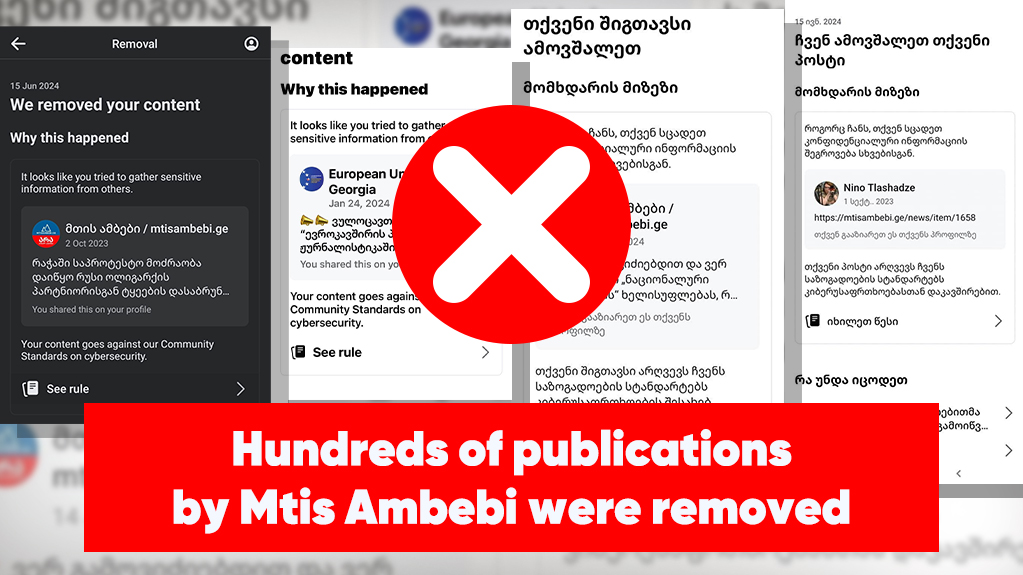Investigative films and critical reports on the Shovi tragedy, the Tchiatura ecological disaster, the occupation of Racha forests, Balda Canyon, and corruption in the Protected Areas Agency, along with other important topics, were massively deleted from the Mtis Ambebi Facebook page.
News
Trending stories
- 1 Former Prime Minister Garibashvili Sentenced to Five Years in Prison After Plea Deal
- 2 Otar Partskhaladze Charged with Organizing Murder of Businessman Levan Jangveladze
- 3 Shalva Papuashvili Says Georgian Dream Filed Complaint with BBC
- 4 Georgian Dream Party Further Tightens Grants Law, Introducing Up to 6 Years in Prison
The deletion of materials from the publication's Facebook page began on June 15 around 11:20 a.m. and lasted for an hour. Currently, more than a hundred materials published in 2023-2024 are no longer available. The content was also removed from the personal pages of users who had shared it or where the publication had been tagged.
"Since this morning, I have already received four messages that the news covered by Mtis Ambebi, which I had shared on my page, was deleted. Three of the deleted posts were related to my family's tragedy, and one of the posts was from October 2023. Draw your own conclusions," wrote Ia Merebashvili, the mother of Davit Beriashvili, who died during the Shovi disaster.
From the Facebook pages of Studio Monitori, the EU Representation in Georgia, the Charter of Journalistic Ethics, and other organizations, materials marking the investigative film by Mtis Ambebi on the Shovi tragedy as a finalist and winner were deleted. Additionally, the video prepared by Movement EDU, in which Gela Mtivlishvili, the Editor-in-Chief of Mtis Ambebi, spoke about the problem of access to public information, was also deleted.
"Everything published and covered by Mtis Ambebi has been deleted from my wall. It seems to be a specially organized effort to erase the traces of the truth," writes psychologist Jana Javakhishvili.
"As it seems, they come to Mtis Ambebi and report articles critical of the government. Facebook deletes these posts. I also received several messages stating that my posts, in which I shared Mtis Ambebi materials, violated rules and standards. I even forgot to congratulate the winners of the Charter Prize because there were links to Mtis Ambebi below the post. I asked Facebook to reconsider the decision. I don't know what the outcome will be, but perhaps we should all do the same. No matter how much they erase, they still can't remove it from our minds. We remember the news about Shovi, the occupation of Racha forests, and many other stories," wrote Tamar Rukhadze, media producer.
Meta, Facebook owner company, cites cybersecurity as the reason for removing the material. "It appears that you have attempted to collect sensitive information from others," the Meta message said. Mtis Ambebi has already contacted Meta for a response.
The Mtis Ambebi Facebook page is not the only one from which materials are being deleted en masse. Nazi Janezashvili, a former member of the Supreme Council of Justice and head of the non-governmental organization Court Watch, says that about 60 posts, including articles about the court clan, have been deleted from his organization's Facebook page. In this case, too, Meta cites cybersecurity as the reason.
Mtis Ambebi has repeatedly been the target of attacks by senior government officials. Due to its participation in the European Union's media competition with a journalistic investigation on the Shovi tragedy, the Speaker of the Parliament, Shalva Papuashvili, demanded a clarification from the EU representative.
Before that, due to its critical coverage of the Shovi tragedy, the then chairman of the ruling party and acting Prime Minister, Irakli Kobakhidze, called the founder and editor of the publication, Gela Mtivlishvili, a scoundrel.
Gela Mtivlishvili was one of the targets of the hate and violence campaign organized by Georgian Dream, in connection with the adoption of the Russian Law on so-called Foreign Agents. Last month in Tbilisi, insulting and defamatory inscriptions were repeatedly left on the building where the Mtis Ambebi editorial office is located. Dimitri Samkharadze, a member of parliament from the ruling Georgian Dream and a member of the political council of the ruling party, admitted that he organized the hate campaign.















